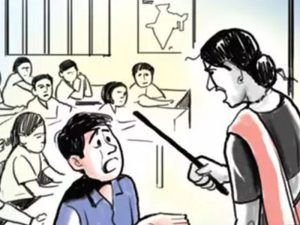Sri Lanka is a nation dedicated to reforming its laws to prohibit corporal punishment in all settings. However, there is an alarming number of reported cases involving cruel punishment and even the death of children.
Sri Lanka demonstrated its commitment to banning all forms of corporal punishment against children, including within homes, during the July 2006 South Asia Forum meeting and the 2005 UN Study on Violence Against Children regional consultation. This commitment was reaffirmed in the Universal Periodic Review of Sri Lanka, wherein the country accepted a recommendation to prohibit corporal punishment in all settings. Nevertheless, prohibition has yet to be achieved in homes, alternative care settings, daycares, schools, and some penal institutions.
Schoolmaster who flogs a student:
Article 82 of the Penal Code of 1883 states that a schoolmaster who flogs a student is not using force illegally. Efforts have been made through various campaigns to repeal such provisions and enforce a prohibition on all forms of corporal punishment and other cruel or degrading forms of discipline in homes and all other settings where adults have authority over children.
Supreme Court:
In a landmark decision, the Supreme Court declared that corporal punishment of children by schools was unlawful and violated a child’s fundamental rights. The teacher of the school in Matara and the government were ordered to pay a total of Rs 650,000 as compensation to the child for slapping him and the resulting injuries. Referencing the Penal Code, the United Nations Convention on the Rights of the Child, and the evolution of government policy, the Supreme Court emphasized that the slapping of a 15-year-old child by a school teacher in Matara constituted unlawful violence against a child and a violation of the child’s constitutional rights.
Many Circulars:
The use of corporal or physical punishment and psychological aggression on students is extensively prevalent in private and international schools. This is despite the circular sent out by the Ministry of Education in 2001 which banned corporal punishment. In yet another circular in 2005, (2005/17) the education ministry drew the attention of school authorities to the fact that all physical and psychological forms of punishment were prohibited, and outlined positive measures to maintain discipline in schools. As recently as April 2016, the Ministry in a circular 12/2016, to all schools cautioned against the use of corporal punishment and once more, listed positive disciplinary methods, according to counterpoint.
It is time to change our attitude towards corporal punishment, recognizing that society needs to shift its thinking that hitting children makes them better. Despite much discussion on the matter, it is now imperative to enforce a total ban on corporal punishment in all settings.
http://Link to reference: https://endcorporalpunishment.org/reports-on-every-state-and-territory/sri-lanka/








